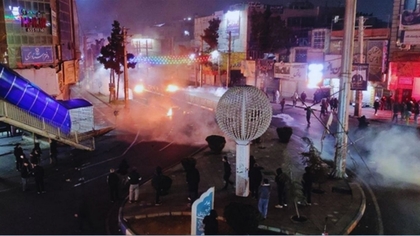Turkey vs. Iran: New Grudge Match Shapes the Middle East
13:57 - 23 December 2011

Not long ago it appeared Ankara and Tehran were the best of friends. Today that situation is different. From Iraq to Lebanon and across the Middle East, Turkey and Iran are locked in a zero sum competition for influence and power. Here’s the story from the FT:
Iran has criticised Turkey’s secular system of government as an unsuitable example for countries in the Arab spring, in the latest sign of growing tension between the two regional powers…
Rivalry between the two neighbours is intensifying as they lock horns over Ankara’s decision to host a Nato missile defence base and the fate of Syria’s president, Bashar al-Assad, as well as the future direction of the Arab spring…
The two countries have also been competing in Iraq, where last year Turkey championed the cause of Iyad Allawi, the secular Shia who sought to be prime minister, the post eventually retained by Nouri al-Maliki, who was given more support by Iran.
The relationship — perhaps contest is a better word — between Turkey and Iran is shaping a new era in Middle Eastern politics. Today, there is little they agree on and little room for anything but political barbs tossed back and forth.
This is partly a replay of Ottoman era politics. The new Turkish Islamist government is eager to revive Turkey’s historical role as the leading power of the region. (Two hundred years ago the Ottoman Empire ruled everything from the Danube to the modern Iran/Iraq boundary and across North Africa as far as Algeria.) As Arab nationalism has failed and declined, Sunni Islam has replaced it as the leading political movement in much of that world. Arab nationalism was both secular and anti-Turkish; Arab nationalists regarded the Ottomans as an imperialist great power. But if Arabs look at the world through a religious lens, Istanbul used to be the seat of the Caliph.
For Iran, this is a bitterly disappointing turn of events. Sunni Turkish Islamism trumps any attempt by Shi’a Iran to ride the Islamist wave to power in the region; at the same time, the conflict in Syria looks increasingly like a struggle for power between Alawite allies of Shi’ism and Iran and Sunnis looking to Turkey. The fall of Assad will also tip the balance away from Shi’a Hezbollah to the Sunnis in Lebanon.
The disappointment and the outrage in Tehran is deep; for thirty years Iran proclaimed itself the speartip of resurgent Islam; when the Islamist wave finally crests, it looks to be driving Iran back in on itself.
Iraq, part of the Ottoman Empire until the British conquered it in World War One, could end up being the most important strategic arena for the new competition.
Some would see this conflict as a sign of US decline in the region, but that remains to be seen. Since World War Two, regional power struggles have tended to reinforce rather than limit Washington’s power. At the minimum, a regional balance of power allows Washington the option to throw its weight from one side to the other and prevent the emergence of a single dominant rival.
We shall see, but one thing looks increasingly clear. If the mullahs get the bomb, the Turks will want one too.
Source – The American Interest
Iran has criticised Turkey’s secular system of government as an unsuitable example for countries in the Arab spring, in the latest sign of growing tension between the two regional powers…
Rivalry between the two neighbours is intensifying as they lock horns over Ankara’s decision to host a Nato missile defence base and the fate of Syria’s president, Bashar al-Assad, as well as the future direction of the Arab spring…
The two countries have also been competing in Iraq, where last year Turkey championed the cause of Iyad Allawi, the secular Shia who sought to be prime minister, the post eventually retained by Nouri al-Maliki, who was given more support by Iran.
The relationship — perhaps contest is a better word — between Turkey and Iran is shaping a new era in Middle Eastern politics. Today, there is little they agree on and little room for anything but political barbs tossed back and forth.
This is partly a replay of Ottoman era politics. The new Turkish Islamist government is eager to revive Turkey’s historical role as the leading power of the region. (Two hundred years ago the Ottoman Empire ruled everything from the Danube to the modern Iran/Iraq boundary and across North Africa as far as Algeria.) As Arab nationalism has failed and declined, Sunni Islam has replaced it as the leading political movement in much of that world. Arab nationalism was both secular and anti-Turkish; Arab nationalists regarded the Ottomans as an imperialist great power. But if Arabs look at the world through a religious lens, Istanbul used to be the seat of the Caliph.
For Iran, this is a bitterly disappointing turn of events. Sunni Turkish Islamism trumps any attempt by Shi’a Iran to ride the Islamist wave to power in the region; at the same time, the conflict in Syria looks increasingly like a struggle for power between Alawite allies of Shi’ism and Iran and Sunnis looking to Turkey. The fall of Assad will also tip the balance away from Shi’a Hezbollah to the Sunnis in Lebanon.
The disappointment and the outrage in Tehran is deep; for thirty years Iran proclaimed itself the speartip of resurgent Islam; when the Islamist wave finally crests, it looks to be driving Iran back in on itself.
Iraq, part of the Ottoman Empire until the British conquered it in World War One, could end up being the most important strategic arena for the new competition.
Some would see this conflict as a sign of US decline in the region, but that remains to be seen. Since World War Two, regional power struggles have tended to reinforce rather than limit Washington’s power. At the minimum, a regional balance of power allows Washington the option to throw its weight from one side to the other and prevent the emergence of a single dominant rival.
We shall see, but one thing looks increasingly clear. If the mullahs get the bomb, the Turks will want one too.
Source – The American Interest



